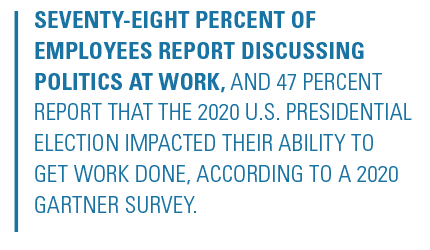Much has been written about political polarization in the U.S. and how a heated political climate has drawn a line in the sand between voters. Self-censorship is also on the rise in the workplace, where some people fear sharing their political views. Nearly a third of employed Americans worry they could lose their jobs or be passed over for career advancements if their political opinions become known, according to a Cato Institute survey. For business leaders trying to build a strong culture, knowing how to manage political expression and discussions in the workplace is critical.
When people at work are afraid to say anything political, that fearfulness isn’t conducive to a cohesive work environment. Rather than ignore it or futilely try to shutter it, business owners and managers are better off having a plan to deal with the political dynamic so it won’t disrupt their business and drive their employees apart.
Here are some tips to help business leaders manage political discussions and tensions, and keep politics in proper perspective, in the workplace:
- Make company culture the first priority. Having an established set of core values gives your team a framework for how they interact with peers, clients and other professional contacts. With a solid workplace culture, core values—like respect for others and their opinions—will carry the day. It reminds everyone they are all on the same team.
- Give flexibility, within reason. Most people don’t want a formal policy related to politics in the workplace. Your leadership team needs to let employees know they are valued as individuals while emphasizing that leaving politics out of the workplace is best for all involved. Let them know you are flexible with their comfort level, but they are also accountable for how they conduct themselves as representatives of your company.
- Keep political programs off the office TVs. You don’t want to invite arguments. Making sure that office TVs in common areas are not tuned to political programs is an easy preventive measure.
- De-escalate, don’t instigate. If a heated political conversation develops between workers, try to cool things off and lead by example. If they persist, tell them their loud conversation is distracting to a productive work environment. If someone you work with expresses a viewpoint that doesn’t align with yours, make a mental note to agree to disagree.
Handling political talk isn’t something to be afraid of. It’s an opportunity to ease the tension and remind employees that no matter their differences, they can remain strong together.PM
Joel Patterson is a workplace culture expert, author and founder of The Vested Group. For more information, visit joelpatterson.com.




